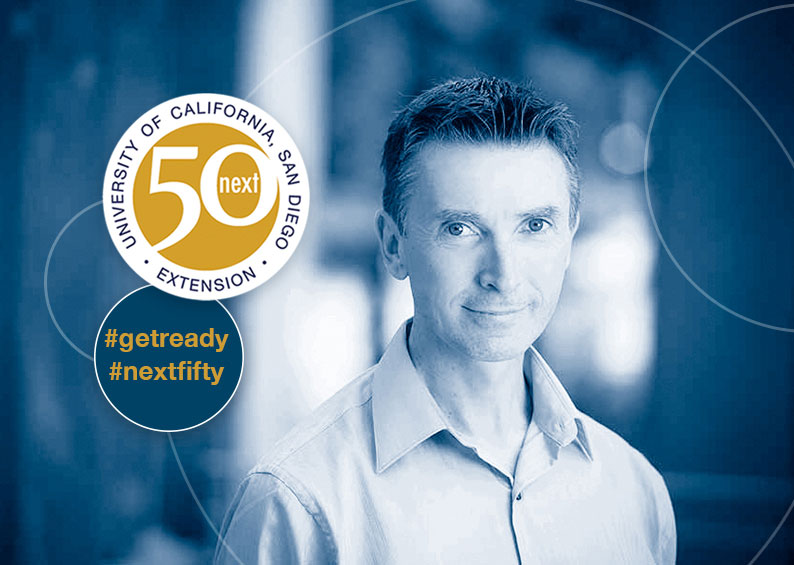
In honor of UC San Diego Extension's first 50 years, 50 Voices of the Future asks thought leaders about the trends, breakthroughs and social advances they foresee over the next 50 years.
A person with some tech savvy and a big idea can transform the world, as we’ve seen from companies as different as Facebook and Uber. Now more than ever, colleges and universities are searching for ways to help students run with these ideas. UC San Diego’s Associate Vice Chancellor for Innovation and Commercialization, Paul Roben, believes he and his colleagues at other schools can help facilitate extraordinary advances in the next few decades in fields ranging from health care to climate-change. “I have a 2-year-old daughter,” he says, “and I can’t even imagine what the world will be like when she gets to college.”
(1) Why is the work you do important?
The world around us has changed. We’re now working in a real disruption economy, where all the rules of the old economy have been turned on their head. We run education programs to help educate students and faculty on “what is innovation, what is entrepreneurship, how do I tell my story, how do I build teams, how do I develop as a leader” so that they can go out and use their ideas to change the world. We give them the tools they need to help them on that journey from idea to impact, whether that be a commercial product, or a social innovation. We also support a lot of resources across the university -- accelerators, incubators, entrepreneurs-in-residence, mentorship programs. All of this is to bring diverse perspectives together, and help people who have good ideas that they think are going to benefit people, turn those ideas into reality. And that’s really what’s important.
(2) What are the influential/exciting developments happening in your field now and why?
The biggest hotel company in the world, AirBnB, doesn’t own a hotel. The biggest taxi company in the world, Uber, doesn’t own a car. We’re working in a different world now. People now have the opportunity to really change the world with ideas, and the economy and society we live in allows them to do that. And data is driving everything – it’s driving sustainability, it’s driving climate change, it’s driving energy. Until now, we’ve been good at generating a whole bunch of data but now we have the ability to analyze that data in meaningful ways so that we can solve some real intractable problems that affect us all as a global society.
(3) What’s the next big thing?
Precision medicine is helping us to develop cures for diseases that were, up until now, incurable. In health care, bringing together wireless technology with sensors, with personalized medicine, is really going to empower individuals to take responsibility for their own health in ways we haven’t seen previously. I’m very encouraged about that. When we get to sustainability and energy, I think we’re going to see massive leaps forward over the next ten years, whether it be water, energy, transportation or climate change. Ten years from now, we’re probably not going to be driving our own cars, which means the idea of ownership of cars is probably going to go away, to some extent at least, which opens up massive possibilities for improving transportation and energy use.
(4) How big an impact will your field play in shaping the future of the San Diego region and beyond?
I think UC San Diego is one of the linchpins in terms of the economic development of the region. Our convening power, our ability to get people in a room talking to each other will play a critical role. We’re facilitators, and if we get the right people in the room, we will really help with all of this.
(5) Hop into your time machine…what does the future look like for this field in 50 years? How can individuals/companies get prepared for what’s next?
I think if we do our job right, my profession may not be here in 50 years. What we’re doing is empowering people to run with their own ideas and turn them into reality. Today’s generation is taking so much more responsibility in their own hands, taking so much initiative. What I’m doing is helping them to open their eyes and lighting a spark. If we’re really good at this, we’ll get to the point where they don’t need us anymore.
AVC Roben is working with UC San Diego Extension and the Downtown San Diego Partnership on its newly established Collaboratory for Downtown Innovation. The goal of the Collaboratory is for UC San Diego to help support and strengthen Downtown’s growing tech ecosystem through a variety of programs that will provide networking, business support and workforce training.